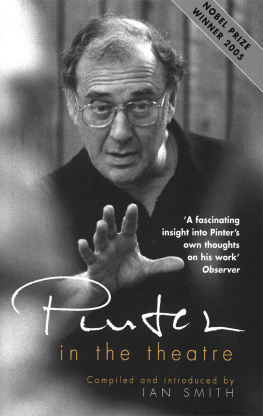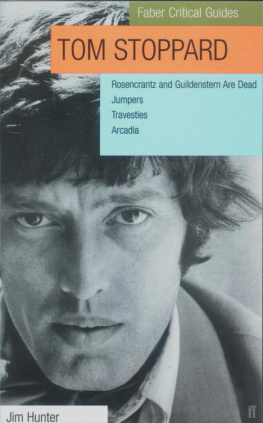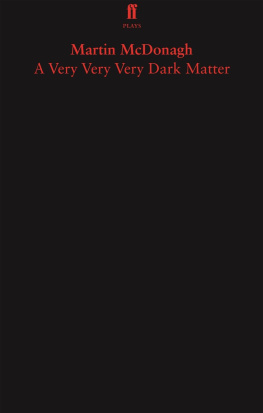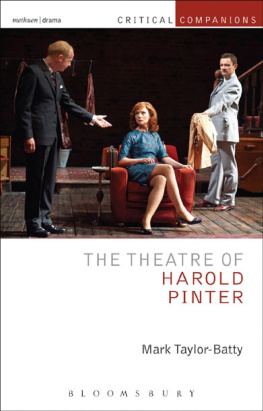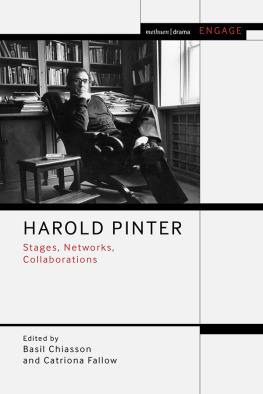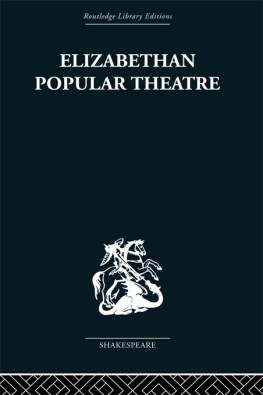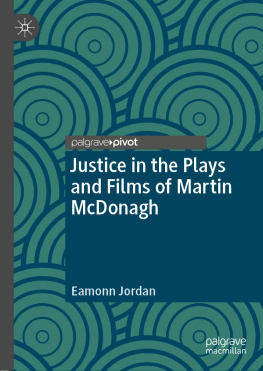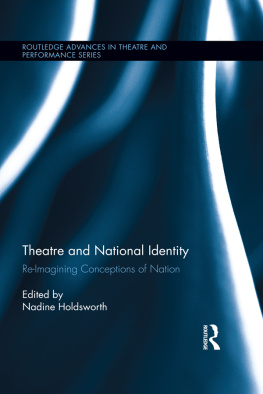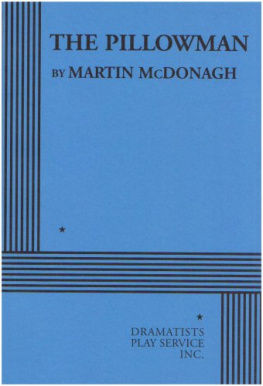THE THEATRE AND FILMS OF MARTIN MCDONAGH
Patrick Lonergan is a lecturer in English at National University of Ireland, Galway. His first book, Theatre and Globalization: Irish Drama in the Celtic Tiger Era, won the 2008 Theatre Book Prize and a 2010 book award from the European Society for the Study of English. He is director of the Synge Summer School for Irish Drama, and has published and lectured widely on Irish theatre.
THE THEATRE AND FILMS OF MARTIN MCDONAGH
Patrick Lonergan

For my mother Madeleine and in memory of my father Paddy
CONTENTS
a brief discussion of the grammar, syntax and pronunciation of McDonaghs Hiberno-English
difficult, unusual or slang words and phrases in the work
historical incidents and characters, and references to other texts, films and plays
bibliography of scholarship on McDonaghs work and of other texts cited
I wish to express my thanks to my home university, National University of Ireland, Galway, which granted me a period of sabbatical leave to allow me to complete this book. I am also grateful to the staff of the universitys Hardiman Library, which holds the Druid Theatre Archive. And I must thank the staff of the Shakespeare Library in Stratford-upon-Avon, who provided very useful information about the premiere production of The Lieutenant of Inishmore. I am also very appreciative of the support of Druid Theatre company, especially from Thomas Conway, Garry Hynes, Rory Lorton and Sinead McPhillips.
Some of the research that this book draws on was completed as part of a research project on the internationalisation of Irish drama, which was funded by the Irish Research Council for the Humanities and Social Sciences. I gratefully acknowledge the Councils support.
Many of the ideas presented here were developed and clarified during conversations (often very heated ones) with colleagues and friends, especially Joan Dean, Karen Fricker, Nicholas Grene, Werner Huber, Eamonn Jordan, Jos Lanters, Martin Middeke, Karen OBrien, Riana ODwyer, Shaun Richards, Tony Roche and Shelley Troupe. I also have to thank those people who have published some of my earlier work on McDonagh, especially Richard Rankin Russell and the editors of Irish Studies Review. And I am glad to be able to thank Jill Dolan, Stacy Wolf and the participants in Princetons 2011 Global Irish Seminar for allowing me to discuss some of these ideas at a crucial stage in the books composition.
My thanks to Mark Dudgeon at Methuen Drama for commissioning this work, and for supporting it (and me) at all stages during its preparation. Thanks also to Ross Fulton and Neil Dowden for their work on bringing the book to publication. I also wish to thank Martin McDonagh for permission to quote from The Pillowman, In Bruges and A Behanding in Spokane, and am also grateful to Charlotte Knight of Knight Hall Agency.
As ever, my family provided essential encouragement and much practical help, and I hope that my wife Therese and daughter Saoirse know how grateful I am. This book is dedicated to my parents: to my mother Madeleine, who did so much to foster and then share my love of theatre, and to the memory of my father, who passed away shortly before this book was completed. Many of Martin McDonaghs plays show that our parents influence is inescapable; but unlike most of McDonaghs characters, that is an inevitability for which Im very grateful.
Quotations from the plays and screenplays of McDonagh are indicated by the following abbreviations, which correspond to the editions specified below.
BQ | The Beauty Queen of Leenane (London: Methuen Drama, 1996) |
SC | A Skull in Connemara (London: Methuen Drama, 1997) |
LW | The Lonesome West (London: Methuen Drama, 1997) |
CI | The Cripple of Inishmaan (London: Methuen Drama, 1997) |
LI | The Lieutenant of Inishmore (London: Methuen Drama, 2001) |
PM | The Pillowman (London: Faber, 2003) |
IB | In Bruges (London: Faber, 2007) |
BS | A Behanding in Spokane (New York: Dramatists Play Service, 2011) |
In addition, the abbreviation SS is used to refer to the film Six Shooter (Irish Film Board, 2005). The script of the film is not in print; quotations are taken directly from the film.
Abbreviations following other quotations in the text refer to titles listed in the Further Reading section at the end of this book.
While I was completing the research for this book, I interviewed Garry Hynes, the great Irish director who introduced Martin McDonagh to the world when she premiered his first play, The Beauty Queen of Leenane, in 1996. We discussed a range of issues about McDonagh: his astonishing success both nationally and internationally, the hostile reaction he has received from many critics and academics, his ongoing popularity with audiences and performers everywhere, and so on. That discussion is reproduced later in this volume, but one point made by Hynes encapsulated perfectly the major argument that I wish to sustain throughout the book.
Wed been discussing the relationship between Mag and Maureen, the motherdaughter pairing at the centre of The Beauty Queen of Leenane. Those characters are now famous for their brutality towards each other: the mother Mag for vindictively destroying her daughters chance of forming a loving relationship, and Maureen for beating Mag to death with a poker in reprisal. Yet one of the strangest features of Beauty Queen is that, despite their appalling treatment of each other, the two women clearly feel some sort of love for each other. Theres no question that they love each other, said Hynes. They are mother and daughter, after all.
To illustrate that point, we began to talk about biscuits. One of the running jokes in the play is that Maureen keeps buying Kimberley biscuits for her mother, even though she considers them the most horrible biscuits in the world (BQ, 24). I hate Kimberleys, Maureen admits. I only get them to torment me mother (24). Yet in the plays seventh scene, theres a brief moment when the two women appear to treat each other kindly: as I discuss in more detail later, Mag compliments Maureens cooking, and she in turn appears to take some pleasure in her mothers being in a funny oul mood (49). The pair continue to bicker with each other, but they do so without malice; theres a sense that they are almost enjoying the cut and thrust of the fighting. And then smiling, as the stage directions state, Maureen offers Mag not a Kimberley but a shortbread finger.
Its easy to overlook this moment, but what Maureen is doing is offering her mother something nice: she is, in other words, not trying to torment Mag as she normally does she wants instead to break from that routine and to do something kind. Minutes later, of course, the interactions between the pair become more negative again, but Maureens brief gesture allows the audience to understand that her instinct and desire is to treat her mother well: that she wants to behave better than she does, that she wants to change that she may even be capable of changing.
Next page

